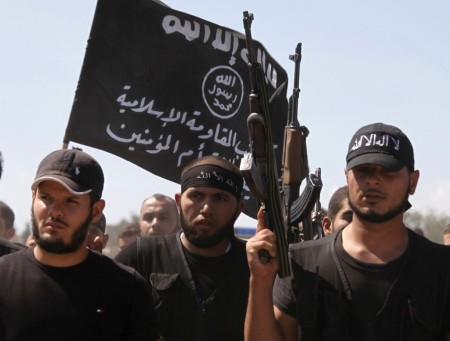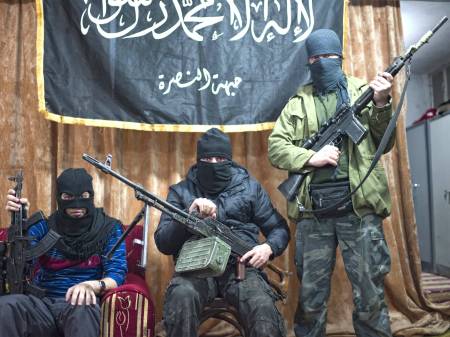The war of the emirates to obtain Syrian territories has become more obvious. Each faction of the major warring parties seeks to take a piece of the land and to control it and its inhabitants by setting its own laws.
Appealing to the popular support base or attempting to gain its consent is no longer the focus of any of these factions. What is important at this stage is the formation of an emirate and its preservation, regardless of the cost. In eastern Ghouta, it seemed clear that Zahran Alloush, the commander of Jaysh al-Islam, only launched his rocket attacks against the neighborhoods of the city of Damascus after he sensed the danger lurking on the borders of his emirate, as the town of Arbin (the gate to Ghouta) was about to launch a reconciliation period with the Syrian army. Such reconciliation poses a significant risk to Alloush’s project and crosses all the red lines that he tried to set in the previous phase. Therefore, the rocket attack campaign, the first of its kind, reflected Alloush’s concern over reconciliations seeping into his own stronghold.
By bombing Damascus and Latakia, Alloush wanted to deliver two messages. The first is addressed to factions, especially those that accepted the reconciliation process in Arbin against his objection. He sought to demonstrate that no one can overstep Jaysh al-Islam, even if Alloush has to destroy everything in his path. The second message is addressed to Syrian authorities. It aims to mislead them into thinking that he is able to change the rules of the game if they decide to come near his emirate’s borders, whether by waging war or offering reconciliation. Through this message, he stressed that the cost of such an attempt will be bombing the regime’s strongholds in the heart of Damascus and Latakia, within the scope of a deterrent policy. The Syrian army’s response was clear. It continued to bombard the strongholds of Jaysh al-Islam in the city of Douma, even after Alloush stopped his rocket attack. This represented a counter message: The Syrian army does not heed the red lines that Alloush believes he has set on the ground.
Moreover, it is likely that Alloush aimed to attract more armed factions to Ghouta and entice them with bombing Damascus, leading them to submit to his leadership. Alloush knows that obtaining total control of eastern Ghouta would require many battles, and thus he would need additional militants. If Alloush decides to fight the coming battles, the battle against Jaysh al-Ummah, in which he gained control over Douma, would seem like mere child’s play.
However, in northern Syria, the emirate of Jabhat al-Nusra now controls the majority of Idlib’s countryside after having expelled moderate factions, most notably the Syria Revolutionaries Front. This particular battle still raises numerous questions, as it was an easy battle and Jamal Maarouf did not exert any real effort to fight it efficiently.
Though Jabhat al-Nusra did not officially announce its emirate, its actions indicate that it considers the region its property. Jabhat al-Nusra established a courthouse, which consists of numerous Sharia courts that are distributed across the region’s towns and villages. This court system aims to implement Islamic law and impose the Hadd punishment on violators. But it also established what it called “the joint force in response to grievances,” a military brigade that will arrest and prosecute perpetrators.
Jabhat al-Nusra recently arrested several wanted men, including leader of the Dawn of Freedom Brigades (Liwa Fajr al-Hurriya) Ayman Frouh. News circulated about Jabhat al-Nusra’s intention to form a “media union” to control regional media and to ban criticism from media activists.
Although Jabhat al-Nusra consistently denied any intention to establish an emirate, several factors forced it to contradict itself and reveal its true plans. The most important of these factors is its competition with IS (Islamic State), which announced the caliphate in June 2014. Jabhat al-Nusra did not find it useful to imitate IS and risk to lose its members, especially since the majority of its members believe the caliphate and the implementation of Sharia are their supreme objectives.
Jabhat al-Nusra also wants to exploit the war waged by the US-led international coalition against IS and to channel the outcomes of this war to its advantage. It would do so by absorbing IS militants who are defeated by the coalition. Without a doubt, Jabhat al-Nusra’s step will greatly confuse the international coalition’s strategy. If the coalition succeeds in eliminating IS, it will face yet another challenge: the emirate led by al-Qaeda’s splinter Jabhat al-Nusra.
While IS’ eastern emirate, which encompasses Raqqa, Deir ez-Zor, and east of Aleppo, is already well established, southern Syria is the sole territory that has yet to be involved in the war of the emirates.
It is surprising that, after Jabhat al-Nusra’s easy battle for control of Idlib’s countryside, the group did not choose Daraa or its countryside as its emirate’s headquarters. Daraa is al-Nusra’s central power hub and the base of its top leaders, such as Abu Maria al-Qahtani and Abu Hassan al-Kuwaiti, who fled from Deir ez-Zor after defeat at the hands of IS.
Even more surprising is Jabhat al-Nusra’s adoption of different policies in the south and north. In the south, it does not seek to monopolize the judiciary, communal organizations, and the media, but instead joined the other factions to form the House of Justice after dissolving its higher court. Is this evidence of internal disagreements within Jabhat al-Nusra? Or are there regional and international authorities that are still able to exert influence on Jabhat al-Nusra and prevent it from going too far in its actions?


Keine Kommentare:
Kommentar veröffentlichen